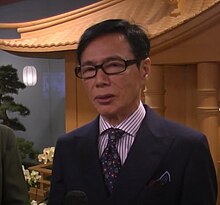| Year/Number | # | Song | #/total | Opponent | Others |
| 1968/19th Kohaku Uta Gassen | 1 | Hana To Chō | 22/23 | Jun Mayuzumi | Penultimate(1) |
| 1969/20th Kohaku Uta Gassen | 2 | Minato Machi Blues | 23/23 | Hibari Misora | Finalista(1) |
| 1970/21st Kohaku Uta Gassen | 3 | Ginza no Onna | 24/24 | Hibari Misora(2) | Finalista(2) |
| 1971/22nd Kohaku Uta Gassen | 4 | Ofukuro San | 25/25 | Hibari Misora(3) | Finalista(3) |
| 1972/23rd Kohaku Uta Gassen | 5 | Sasurai Bune | 01/23 | Mari Amachi | First singer(1) |
| 1973/24th Kohaku Uta Gassen | 6 | Fuyu no Tabi | 18/22 | Mina Aoe |
| 1974/25th Kohaku Uta Gassen | 7 | Erimo Misaki | 25/25 | Chiyoko Shimakura | Finalista (of all singers)(4) |
| 1975/26th Kohaku Uta Gassen | 8 | Ah Hito Koishi | 18/24 | Rumiko Koyanagi |
| 1976/27th Kohaku Uta Gassen | 9 | Sazanka | 19/24 | Aki Yashiro(1) |
| 1977/28th Kohaku Uta Gassen | 10 | Tokyo Monogatari | 23/24 | Harumi Miyako(1) | Penultimate(2) |
| 1978/29th Kohaku Uta Gassen | 11 | Kimiyo Koyae | 23/24 | Harumi Miyako(2) | Penultimate(3) |
| 1979/30th Kohaku Uta Gassen | 12 | Shinjuku Minatomachi | 20/23 | Masako Mori(1) |
| 1980/31st Kohaku Uta Gassen | 13 | Koidukiyo | 22/23 | Sachiko Kobayashi(1) | Penultimate(4) |
| 1981/32nd Kohaku Uta Gassen | 14 | Inochi Ataete | 20/22 | Harumi Miyako(3) |
| 1982/33rd Kohaku Uta Gassen | 15 | Kagewo Shitaite | 22/22 | Harumi Miyako(4) | Finalista (of all singers)(5) |
| 1983/34th Kohaku Uta Gassen | 16 | Fuyu no Riviera | 20/21 | Sachiko Kobayashi(2) | Penultimate(5) |
| 1984/35th Kohaku Uta Gassen | 17 | Kita no Hotaru | 20/20 | Harumi Miyako(5) | Finalista(6) |
| 1985/36th Kohaku Uta Gassen | 18 | Onna Moyou | 20/20 | Masako Mori(3) | Finalista (of all singers)(7) |
| 1986/37th Kohaku Uta Gassen | 19 | Yuusuge no Koi | 20/20 | Sayuri Ishikawa(1) | Finalista (of all singers)(8) |
| 1987/38th Kohaku Uta Gassen | 20 | Kanashii Keredo... | 01/20 | Aki Yashiro(2) | First singer(2) |
| 1988/39th Kohaku Uta Gassen | 21 | Kyoto Satigatashi | 18/21 | Naomi Chiaki |
| 1989/40th Kohaku Uta Gassen | 22 | Yubiwa | 18/20 | Sachiko Kobayashi(3) |
| 1990/41st Kohaku Uta Gassen | 23 | Ofukuro San (2) | 29/29 | Harumi Miyako(6) | Finalista (of all singers)(9) |
| 1991/42nd Kohaku Uta Gassen | 24 | Nakase Ame | 25/28 | Kye Eun Sook | |
| 1992/43rd Kohaku Uta Gassen | 25 | Gekijo no Mae | 23/28 | Miyako Otsuki |
| 1993/44th Kohaku Uta Gassen | 26 | Saraba Tomo yo | 25/26 | Harumi Miyako(7) | Penultimate(6) |
| 1994/45th Kohaku Uta Gassen | 27 | Ofukuro San (3) | 21/25 | Saori Yuki and Shoko Yasuda(1) | |
| 1995/46th Kohaku Uta Gassen | 28 | Kanashimi no Utsuwa | 24/25 | Harumi Miyako(8) | Penultimate(7) |
| 1996/47th Kohaku Uta Gassen | 29 | Yoru no Shijima | 10/25 | Harumi Miyako(9) | Finalista in the first half(1) |
| 1997/48th Kohaku Uta Gassen | 30 | Erimo Misaki (2) | 23/25 | Sayuri Ishikawa(2) |
| 1998/49th Kohaku Uta Gassen | 31 | Fuyu no Tabi (2) | 22/25 | Ayako Fuji |
| 1999/50th Kohaku Uta Gassen | 32 | Ofukuro San (4) | 24/27 | Saori Yuki and Shoko Yasuda(2) |
| 2000/51st Kohaku Uta Gassen | 33 | Shū Ressha | 22/28 | Miyuki Kawanaka |
| 2001/52nd Kohaku Uta Gassen | 34 | Sore wa Koi | 20/27 | Fuyumi Sakamoto |
| 2002/53rd Kohaku Uta Gassen | 35 | Unga | 13/27 | Mitsuko Nakamura | Finalista in the first half(2) |
| 2003/54th Kohaku Uta Gassen | 36 | Ōkami tachi no Tōboe | 15/30 | Namie Amuro | Finalist in the first half(3) |
| 2004/55th Kohaku Uta Gassen | 37 | Saraba Seishun no Kage yo | 24/28 | Mai Kuraki |
| 2005/56th Kohaku Uta Gassen | 38 | Ofukuro San (5) | 23/29 | Ai |
| 2006/57th Kohaku Uta Gassen | 39 | Ofukuro San (6) | 13/27 | Sayuri Ishikawa(3) | Finalist in the first half(4) |
| 2007/58th Kohaku Uta Gassen | 40 | Kita no Hotaru (2) | 26/27 | Akiko Wada | Penultimate(8) |
| 2008/59th Kohaku Uta Gassen | 41 | Ofukuro San (7) | 25/26 | Yoshimi Tendo | Penultimate(9) |
| 2009/60th Kohaku Uta Gassen | 42 | Hana To Chō(2) | 11/25 | Miyuki Kawanaka(2) | Finalist in the first half(5) |
| 2010/61st Kohaku Uta Gassen | 43 | Erimo Misaki (3) | 12/22 | Yoshimi Tendo(2) | Finalist in the first half(6) |
| 2011/62nd Kohaku Uta Gassen | 44 | Minato Machi Blues (2) | 10/25 | Ringo Shiina(3) | Finalist in the first half(7) |
| 2012/63rd Kohaku Uta Gassen | 45 | Fuyu no Riviera (2) | 11/25 | Ayaka Iida | Finalist in the first half(8) |
